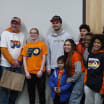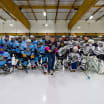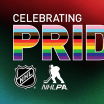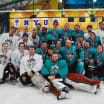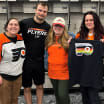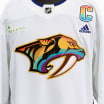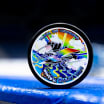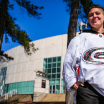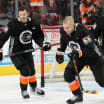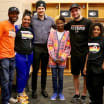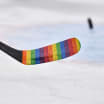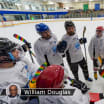The emails went out, and Patrick Burke could only hope. So many thoughts were wrapped up in these emails, pleas to NHL teams and players and general managers for help on a project that was a response to grief and fury, a response to the death of his younger brother, Brendan.
You Can Play celebrates 10 years of helping LGBTQ+ community in hockey
NHL partner has promoted acceptance, 'revolutionized the sport'
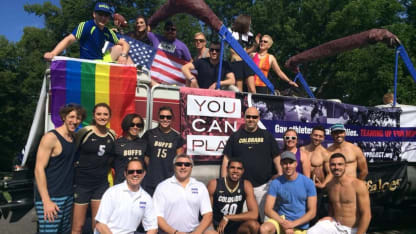
"I was sitting there in the library of my law school, watching these emails go out, just sitting there almost having panic attacks, like, God, this better work," said Burke, who had made the asks with his father, Brian, then the general manager of the Toronto Maple Leafs and now the president of hockey operations for the Pittsburgh Penguins.
"This better go well. The response better be good."
It didn't take long, 20 or 30 minutes or so, before email replies started pinging his inbox.
Whatever you need, we're there. How can we help? What do you want us to do?
Zdeno Chara was in. Brooks Orpik was in.
They were the first players. Many followed. You Can Play was born.
Patrick Burke had wanted to find a way to help bring acceptance of LGBTQ+ issues to sports and a way of honoring Brendan, the former student manager of the men's hockey team at Miami (Ohio) University, who came out as gay before his death Feb. 5, 2010, at the age of 21 in a car accident.
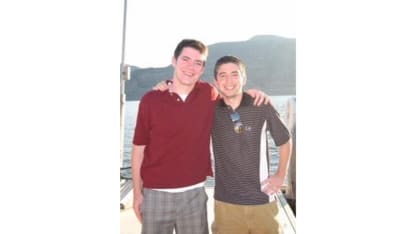
Then Glenn Witman, the founder of GForce Hockey, invited him to a panel in Denver in early 2011, along with Brian Kitts, who had worked in marketing for the Colorado Avalanche. The three, who met for the first time that night, retired to a bar after the event. Many drinks, and much conversation later, they had made a promise, to themselves and the people they loved: They were going to start a conversation. Beyond that, they had no idea.
"We were drunk at a bar in Denver and you make promises to each other and then wake up the next day and say, 'Man, what are we going to do now?'" Kitts said.
At the beginning, it was just going to be a video project, an attempt to mirror the then-viral It Gets Better Project within sports. They went to multiple LGBTQ+ organizations and offered to put it together.
"And every single one of them passed, and said, you're not going to get something like that going in sports," Burke said. "Major organizations were telling us flat-out, 'Do not waste your time in the sports world. It's not going to happen. It's not going to work.'"
Burke, Witman and Kitts didn't agree. You Can Play debuted March 4, 2012.
"We thought it was both necessary and possible," Burke said. "And a lot of people were telling us it wasn't necessary, and it wasn't possible. But we weren't willing to listen to that."
Ten years later, You Can Play is a fixture in the sports world, especially in hockey, a beacon for LGBTQ+ athletes and a promise to them, all contained within a simple message: If you can play, you can play.
\\\\
For Juls Ries, her hockey team is a safe space. Always has been.
Armed with an accepting family and supportive coaches, two of whom are part of the LGBTQ+ community, she came out at 13 years old, blossoming in front of Nora Cothren, one of those coaches and a co-chair of the Northeast Regional Board for You Can Play. It's an image that Cothren marvels at, the confidence, the steadiness, the ability to be unabashedly herself.
"When you see kids like Juls, who are coming out at 13 to their hockey teams with nothing but love and acceptance, is quite frankly emotional," Cothren said, acknowledging that not every kid has as accepting an environment as Ries. "I'm so happy for these kids. Because I'll never be able to know what my friendships and hockey experience would be like had I come out right when I realized when I was gay.
"There's so many what-ifs. And kids in this generation won't have those what-ifs."
Cothren had been through it, through the casual homophobia and the slurs, the environment that kept her in the closet until her senior year in high school with her high school team, and until her senior year in college with her college team.
"I was sure that I was going to lose all my friends, that they wouldn't want me as their captain," Cothren said. "I'm going to have less playing time. My coach isn't going to respect me. There were so many things that were going in my mind and it took me to a place that was extremely dark."
There were moments where she thought: Do I play hockey and be miserable and not be myself? Or is it not worth being here anymore?
She is overjoyed to see that the choice isn't always so stark anymore, at least for some. She said she believes that if her teenage self had seen a Pride Night or seen the public service announcements by You Can Play, it would have been life-changing.
It has been for many.
"When we started out as an organization, we weren't sure where we were going," Witman said. "But, man, we have made such an impact. We have saved lives, we've gotten letters from parents, from athletes, thanking us for doing what we do."
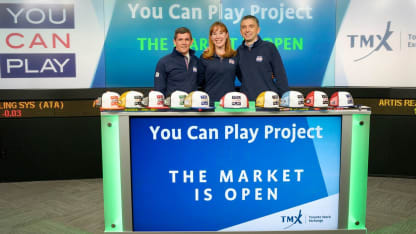
Ries, now 16, was in attendance at the Philadelphia Flyers Pride Night this season, a guest of Flyers players Scott Laughton and James van Riemsdyk via You Can Play. Laughton took time to go over to Ries in the penalty box, to give her a stick signed by multiple teammates and adorned in Pride Tape, to acknowledge her.
"Although I don't think that being different should be something that we have to talk about, unfortunately in today's world it is," Ries said. "And to be able to see professional athletes being able to talk about you and support you is super helpful."
And it was her hockey team at Ed Snider Youth Hockey, a nonprofit program that serves under-resourced youth, along with her family, that provided some of the most crucial support, that eased her path and made her feel welcome and right, part of something.
"It was normal," Ries said. "Like it should be."
\\\\
When You Can Play started, it was run by three people with no experience in the space, no ideas about how to run nonprofits, no infrastructure. It was built on phones, in stolen moments, with Gmail accounts and early mornings and late nights, juggling full-time jobs and law school, surviving on the strength of their message, their hard work and a whole lot of caffeine.
But the moment when the first PSA, filmed for free by HBO, went out March 4, 2012, is viscerally remembered by many.
Seeing that message coming out of those mouths -- Rick Nash, Duncan Keith, Brian Boyle, Matt Moulson, Joffrey Lupul, Claude Giroux, Daniel Alfredsson, Scott Hartnell, Corey Perry, Andy Greene, Dion Phaneuf and Henrik Lundqvist -- drew tears.
Some of the biggest names in the NHL were telling LGBTQ+ athletes that they belonged.
"I just remember thinking about what I would have felt like when I was a kid if I would have seen someone like Henrik Lundqvist standing with me, the impact that would have had for me," said Kevin Jennings, a founding member of the Advisory Board for You Can Play. He founded the Gay, Lesbian & Straight Education Network (GLSEN) and was as an assistant secretary for education during the Obama administration.
If you can play, they said, you can play.
"As a lifelong Flyers fan, seeing Claude Giroux and Scott Hartnell in that really took me aback," Cothren said. "It was extremely impactful. It was saying to me that someone like me, in the hockey world, really belonged and had the support of not only these two Flyers, but a list of NHL All-Stars.
"It was everything. It was everything. … It was the first signal that maybe hockey could be a safe space."
She had never even considered the possibility that hockey could go there, knowing the culture of machismo that sometimes surrounds the game, the discomfort at times in her own high school locker room.
She wasn't alone.
"I had no idea the impact You Can Play would end up having on the hockey world and the culture within hockey," said Lee-J Mirasolo, the associate head coach of the women's hockey team at Harvard. "To me, it was like, holy smokes, this person and his dad, they care about us. That's how I felt."
It was a message coming from an established hockey family, a way of opening the dialogue that felt doable.
"You had a recognition that there is some type of culture shift that was needed 10 years ago," said Paul LaCaruba, who has worked at the NHL in social impact since 2014 and is now vice president, growth strategies and innovation. "Then you had this very traditional, brash hockey family have a personal recognition that they could be the face of a positive social impact movement in the Burkes.
"It gave it immediate credibility and courage for other people who were either already dealing with those personal issues behind the scenes … to say that there's change that's needed in the sport, from the language that we use in the locker rooms all the way to the way we overtly treat people in the LGBTQ community."
With them, though, the conversation opened.
"You Can Play gave us the courage to stand for something more," LaCaruba said of the NHL as a whole, which became an official partner of You Can Play in 2013-14, when the Florida Panthers held the first Equality Night, the precursor to Pride Night.
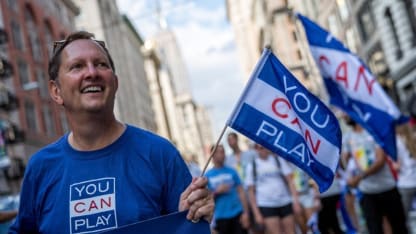
It has become normal to see NHL players march in Pride parades. To see them affix Pride Tape to their sticks. But it was not even 12 years ago that the Stanley Cup made its first appearance at a Pride parade, when Brent Sopel, then of the Cup-winning Blackhawks, made a gesture to honor Brendan Burke at the 2010 Chicago Gay Pride Parade that reverberates today.
And it has become more than just a message.
"You Can Play has revolutionized the hockey world," Jennings said.
Jennings should know. The lifelong hockey fan -- a credit to his Bostonian father who raised Jennings in the rural South -- recalls being harassed by hockey players as an undergraduate at Harvard. He acknowledges the sport had a long way to come, and marvels at what You Can Play has done.
"I would honestly say that You Can Play is one of the most effective public education campaigns on LGBTQ rights in my lifetime, and I'm 58 and I have been in the leadership of the LGBT movement for over 30 years," Jennings said. "It really has revolutionized the sport."
\\\\
The plan was always that at some point, at some distant date, You Can Play might no longer be needed.
As Kitts said, "If we aren't relevant at some point, that's absolutely OK."
That day is not today.
There is no out player in the NHL. There are bills moving through legislatures across the United States that would bar transgender athletes from participating in sports that align with their gender identity. The 2019 GLSEN National School Climate Survey found 43.7 percent of LGBTQ+ students avoided locker rooms because they felt unsafe or uncomfortable, second only to bathrooms.
"We need to support those kids," said Burke, the NHL vice president of player safety, who left You Can Play in 2017 to allow more space for queer voices in the organization. "They need protection. They need the support and the love of the sports community more than anyone. When you see things like what's happening to trans athletes across North America, it just reemphasizes that this work is not done.
"We can't just relax and say, 'Great, we've had every NHL team participate in You Can Play, work's done.' That is absolutely not the case."
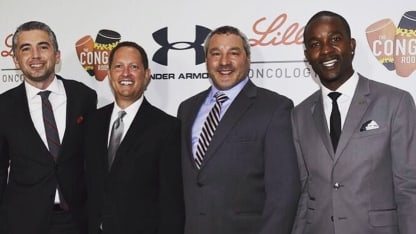
But, at the same time that You Can Play is very much needed, there is also much to celebrate in how far it has come. Luke Prokop, a Nashville Predators prospect, became the first player under contract to an NHL team to come out, which he did July 19 to significant and vocal support from the NHL and its players. You Can Play has spoken in front of the United Nations on LGBTQ+ issues in sports and won the Stuart Scott ENSPIRE Award from ESPN. Player participation in Pride parades has become a non-story because it's so common. Acceptance from younger generations has increased as generational shifts have set in. Pride Tape proliferates, and the language of hockey has changed dramatically.
"It is the backbone of safety," said Cory Oskam, a transgender hockey player whose name honors former Vancouver Canucks goalie Cory Schneider. "We get wrapped up in a lot of policies and dressing rooms and changing rooms and who wears what and who doesn't wear what. We really forget the fact that we're just trying to give sport to all people and make it fun and safe."
And in people like Oskam, like Ries, who remain in the game, Brendan Burke lives on.
"The one thing I always hope is that he would be proud of me," Burke said. "I like to think he would."
That seems clear.
"What's been done in his name, it's changed the world of hockey forever," Jennings said. "I'm just in awe of the change they created."
